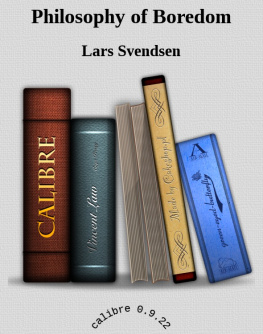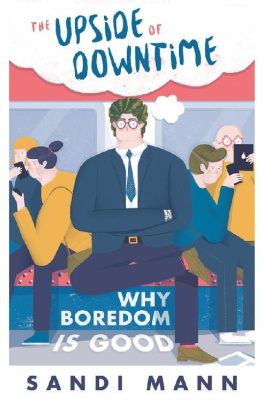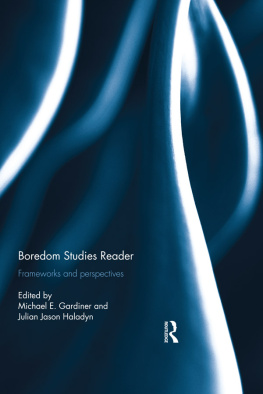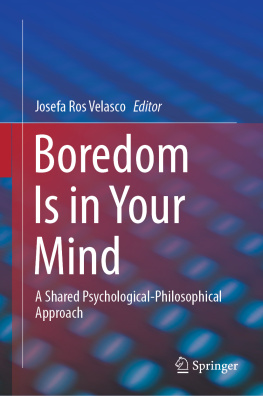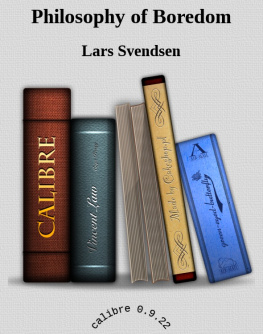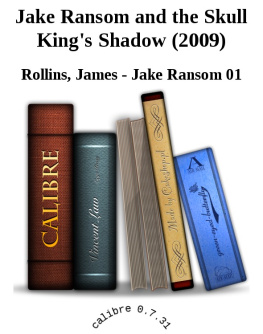James Danckert - Out of My Skull: The Psychology of Boredom
Here you can read online James Danckert - Out of My Skull: The Psychology of Boredom full text of the book (entire story) in english for free. Download pdf and epub, get meaning, cover and reviews about this ebook. year: 2020, publisher: Harvard University Press, genre: Home and family. Description of the work, (preface) as well as reviews are available. Best literature library LitArk.com created for fans of good reading and offers a wide selection of genres:
Romance novel
Science fiction
Adventure
Detective
Science
History
Home and family
Prose
Art
Politics
Computer
Non-fiction
Religion
Business
Children
Humor
Choose a favorite category and find really read worthwhile books. Enjoy immersion in the world of imagination, feel the emotions of the characters or learn something new for yourself, make an fascinating discovery.

- Book:Out of My Skull: The Psychology of Boredom
- Author:
- Publisher:Harvard University Press
- Genre:
- Year:2020
- Rating:4 / 5
- Favourites:Add to favourites
- Your mark:
- 80
- 1
- 2
- 3
- 4
- 5
Out of My Skull: The Psychology of Boredom: summary, description and annotation
We offer to read an annotation, description, summary or preface (depends on what the author of the book "Out of My Skull: The Psychology of Boredom" wrote himself). If you haven't found the necessary information about the book — write in the comments, we will try to find it.
Out of My Skull: The Psychology of Boredom — read online for free the complete book (whole text) full work
Below is the text of the book, divided by pages. System saving the place of the last page read, allows you to conveniently read the book "Out of My Skull: The Psychology of Boredom" online for free, without having to search again every time where you left off. Put a bookmark, and you can go to the page where you finished reading at any time.
Font size:
Interval:
Bookmark:
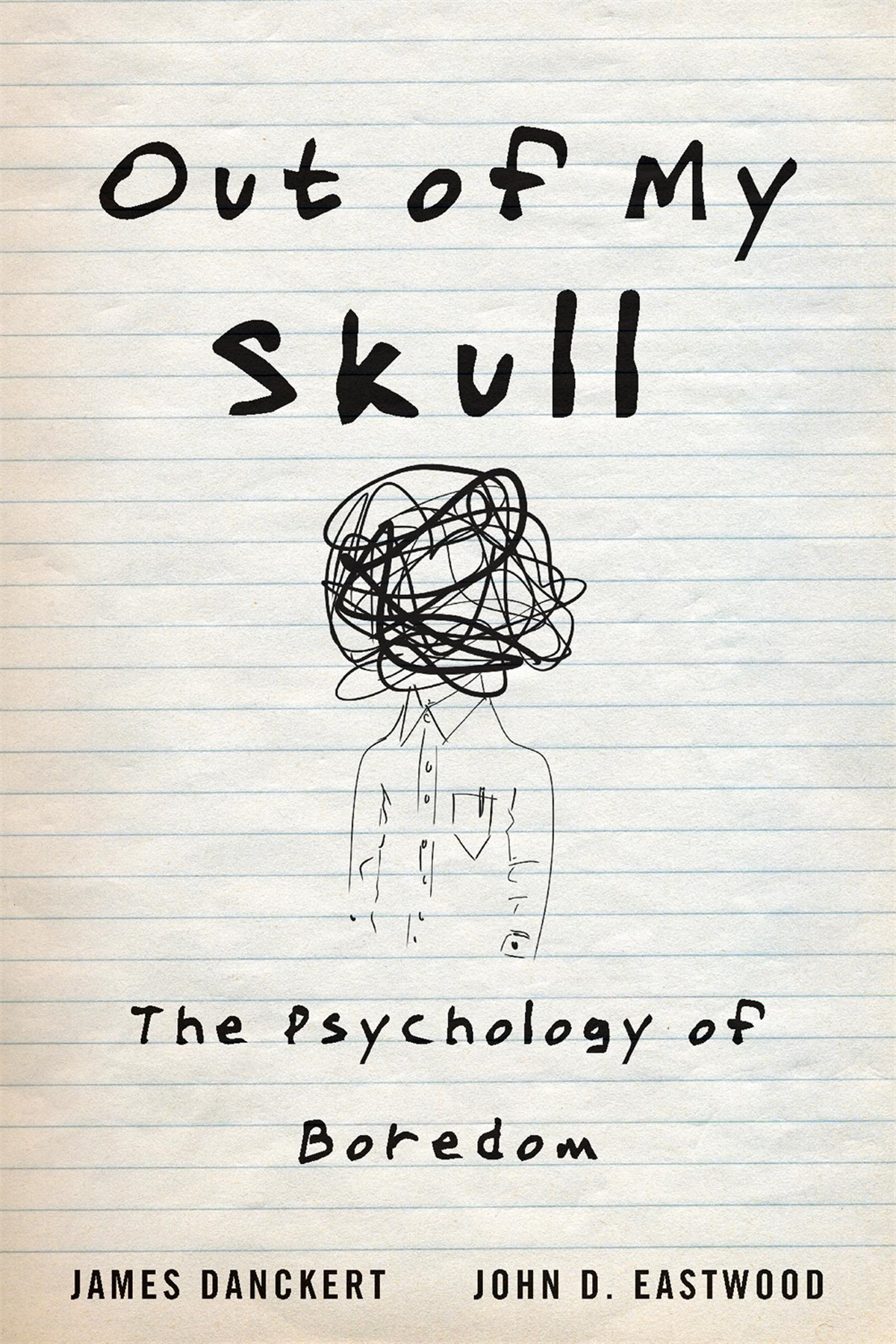
Out of My Skull
The Psychology of Boredom
JAMES DANCKERT
JOHN D. EASTWOOD

CAMBRIDGE, MASSACHUSETTS AND LONDON, ENGLAND2020
Copyright 2020 by the President and Fellows of Harvard College
All rights reserved
Many of the designations used by manufacturers and sellers to distinguish their products are claimed as trademarks. Where those designations appear in this book and Harvard University Press was aware of a trademark claim, then the designations have been printed in initial capital letters.
Cover design: Graciela Galup
Cover image: Getty Images
978-0-674-98467-7 (cloth)
978-0-674-24705-5 (EPUB)
978-0-674-24706-2 (MOBI)
978-0-674-24707-9 (PDF)
The Library of Congress has cataloged the printed edition as follows:
Names: Danckert, James, 1972 author. | Eastwood, John D. (John David), 1970 author.
Title: Out of my skull : the psychology of boredom / James Danckert and John D. Eastwood.
Description: Cambridge, Massachusetts : Harvard University Press, 2020. | Includes bibliographical references and index.
Identifiers: LCCN 2019045209
Subjects: LCSH: BoredomPsychological aspects.
Classification: LCC BF575.B67 D343 2020 | DDC 152.4dc23
LC record available at https://lccn.loc.gov/2019045209
To my brother Paul.
Often bored, never boring
JD
For Ben and Bronwyn:
may your days be full of
meaningful engagement
JDE
You arrive early to renew your drivers license, hoping to avoid the crowds. No such luck. It seems others must have had the same idea, since the building is teeming with people. Stepping up to the counter you hear: Please take a number and have a seat.
You shuffle to the nearest chair in dread. Your body twists and fidgets restlessly. You cast your eyes about, looking here and there for relief. After reading all the posters in the room, which outline the regulations for everyone from first-time drivers to crane operators, you slump forward and prop your head in your hands. Ticket numbers are slowly announced. The lethargy comes in waves, punctuated by moments of irritability. Youre drained of energy and yet edgy, restless. You read the posters again. The urgency to act builds as time crawls.
Suddenly, you remember your phone. You tremble as you reach for it, anticipating the relief youve been craving. After you insert your earbuds and unlock your phone, your body relaxes, your mind clears, and a soothing calm envelops you. Crisis averted? Perhaps. Youve drowned out a very unpleasant feeling. Thats a good thing but what if boredom was trying to tell you something?
Boredom comes for each of us in those moments when we cant see a way forward, when we want to be doing something but dont want to do anything currently on offer. We could call it sluggishness or listlessness. Or, perhaps its the opposite, a sense of being antsy, restless for something but unsure of what will satisfy. While boredom can be described in any number of ways, weve all felt it. We contend that we should pay attention to it and understand it. In our view, being bored is quite fascinating, and maybe, just maybe, it might even be helpful.
For years the topic of boredom has been explored by philosophers, historians, and theologians. Yet, despite the fact that boredom is ubiquitous, until now it has received relatively little attention from the scientific community. With Out of My Skull we seek to change that trend. Psychologythe scientific study of mind and behavioris well positioned to shed light on the human experience of boredom. As psychologists who have been publishing research on boredom for the last fifteen years, with expertise spanning neuroscience and clinical psychology, weve developed an understanding of boredom that emphasizes the key concepts of engagement and agency. Our approach has the virtue of being able to account for a wide range of scientific research findings and draws together diverse approaches to boredom.
But despite our conviction that boredom has a message for you, we would not be so bold as to tell you how to live your life. Boredom itself cant tell you what to do, either. In that sense, you are on your own. This is precisely one of boredoms key messages and, by extension, a core theme of this book. As humans, we need self-determined, effective connection with the world. We need to be engaged, mentally occupied, giving expression to our desires and exercising our skills and talents. In short, we have a need for agency. When this need is fulfilled, we flourish. When this need is thwarted, we feel bored, disengaged.
In this regard, boredom reveals an important aspect of being human: we have a strong need to be engaged with the world around us. As well see, a number of substitutes for true engagement might be very tempting and might even beat back boredom in the short term. But such temporary salves never last, and boredom will return with a vengeance. After that, it is up to us to embrace our agency.
Boredom is an elusive subject, with tentacles that stretch into diverse areas of human inquiry. In part, this is what makes it so fascinating, but it is also what makes it so maddening. Consider an exchange between Humpty Dumpty and Alice in Lewis Carrolls Through the Looking-Glass: Humpty Dumpty scornfully asserts to Alice that When I use a word it means just what I choose it to meanneither more nor less. Alice correctly responds: The question is whether you can make words mean so many different things.
The communication breakdown between Alice and Humpty is emblematic of much of boredom inquiry to date. Although committed to the idea that there is no correct or incorrect way to define boredom, we believe more precision is in order.
In Out of My Skull we endeavor to define the elusive subject of boredom with a decidedly psychological approach, as we consider boredom to be an experience occurring inside our minds. We further offer an organizing framework for what has been a fragmented field of study. We hope this will function as a common ground for a wide range of readers and scholars to meet and exchange ideas.
We start our journey by asking What is boredom? Just as with most everyday experiences, most of us feel we know boredom welluntil we try to define it. The closer we look, the more mysterious and intriguing boredom becomes. Next, we ask What is boredom good for? Why would evolutionary forces have shaped us to be affected by such a negative experience? As well see, it is actually beneficial to have the capacity to be bored. When it does strike, we need not fear. The trick is in responding well to the signal.
Then we turn our attention to the question What makes us bored? The answer is not simple. Boredom, like beauty, could be said to be in the eye of the beholder. One persons joy is anothers boredom. However, there are key factors within us, as well as within the situations we find ourselves in, that increase our risk of succumbing to boredom. We further examine how boredom involves being cut off from others and from our critical need to create meaning and find purpose. We then scrutinize boredoms opposites to deepen our understanding of the experience and set the stage for considering what optimal responses to boredom might look like.
Font size:
Interval:
Bookmark:
Similar books «Out of My Skull: The Psychology of Boredom»
Look at similar books to Out of My Skull: The Psychology of Boredom. We have selected literature similar in name and meaning in the hope of providing readers with more options to find new, interesting, not yet read works.
Discussion, reviews of the book Out of My Skull: The Psychology of Boredom and just readers' own opinions. Leave your comments, write what you think about the work, its meaning or the main characters. Specify what exactly you liked and what you didn't like, and why you think so.

